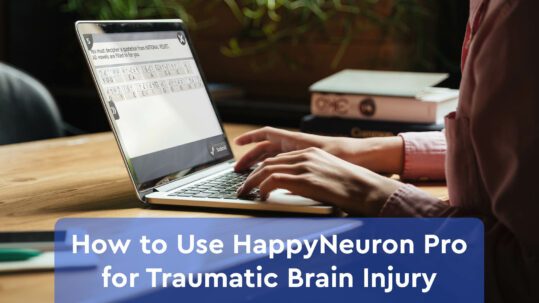Living Well After Brain Injury
Brain injury impacts our physical, mental, and social health. Many people with brain injury are at risk of developing further health complications. Brain injuries may cause people to eat poorly, not exercise, feel depressed, and become isolated from society. Researchers and clinical providers put together a quick guide for what it means to live well after brain injury. Here are 4 areas of health and how you can help your client with brain injury live well.
4 areas of Health & How You Can Help Your Client with Brain Injury
Physical Health
Taking care of a client with brain injury’s physical health may look like helping them learn how to make smart food choices or introducing physical activity. Some tips clinicians and researchers have for maintaining physical health after TBI are: limiting TV time to an hour per day, taking a walk 1-2x a week with a companion, and making sure your client keeps up with their medical needs (primary care physician, dentist, psychologist, etc). Studies show that just 30 minutes of exercise a couple of times a week has significant benefits for mental well-being.
Cognitive Health
Yes, the brain is an organ but it has a lot of characteristics like a muscle. If Just like muscles can atrophy, cognitive function can deteriorate if there is not enough stimulation. Cognitive function decline is the most well-documented result of brain injury. Many patients with brain injury struggle with executive functioning, working memory, recall, processing speed, and attention. Cognitive rehabilitation therapy may help people with brain injury get back into the community. Some clinicians providing cognitive rehabilitation may use a combination of worksheets and digital tools. These materials are used to stimulate clients’ minds and help them practice important cognitive skills. Other activities that may help provide your client with their cognitive health include: reading books they enjoy, taking a class about a topic they are interested in, or learning an instrument.
Social Health
The quote “no man is an island” by John Donne is representative of everyone’s need for connection. People with brain injury are likely to become isolated due to the resulting cognitive, mental, and physical health consequences of their injury. To help improve Social health it is recommended to include working on social cognition and social skills during therapy sessions. Encouraging your client to join a brain injury support group, or finding a social group of their interest. For adults, many social groups exist for different interests, such as the arts or social sports leagues. Social media is a great way to discover new groups in your client’s area. Volunteering for a cause that your client is passionate about is another way to meet people and develop meaningful relationships. It is also a great way for your patient to learn new skills that could be used down the road for other jobs.
Emotional Health
Emotional health refers to your client’s emotional well-being. Maintaining emotional health involves self-care, checking in with oneself to ensure that they are getting their emotional needs met, and having strategies in place to handle life’s highs and lows. Ways you can help your client with a TBI with their emotional health include helping them find a support group, encouraging them to talk about their emotions, listening to them when they discuss a problem with you and helping them develop strategies to regulate their emotions and tackle off days.
Conclusion
Experiencing a brain injury is a life-changing event. Neuropsychologists, occupational therapists, speech-language pathologists, physical therapists, psychologists, social workers, and other medical professionals work with brain injury patients. It is important for each kind of clinical provider to address the many health needs of their client. During therapy sessions, you may want to try making a “wellness wheel” like the authors of the source article. Introducing wellness wheels allows both you and your client to identify and tackle obstacles that can impact their well-being. Maintaining health after brain injury is a team effort involving the therapist, patient, and patient’s support system. By making a plan to address these areas of your client’s well-being you may be able to help your client avoid further complications of their brain injury and live a healthy life.
Disclosure
With any exercise program or health behavior, your client should always consult with their physician before starting to ensure their safety and well-being prior to participation. Encouraging your client to find an exercise program that is safe and feasible for them can help them take charge of their physical and mental health and prevent them from experiencing further ailments related to changeable lifestyle choices.
Source:
Hawley, L., Hart, T., Waldman, W., Glenn, M., Hammond, F., & Dams-O’Connor, K. (2018). Living well after traumatic brain injury. Archives of physical medicine and rehabilitation, 99(7), 1441-1442.









